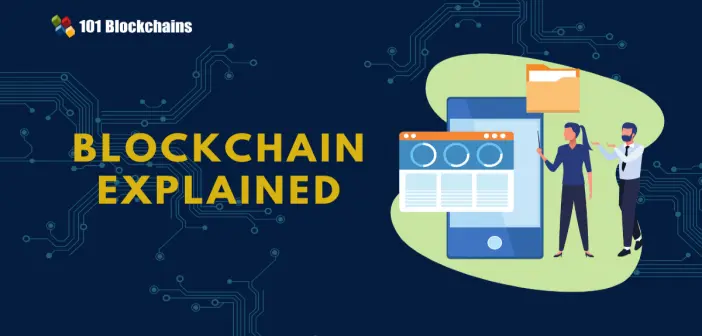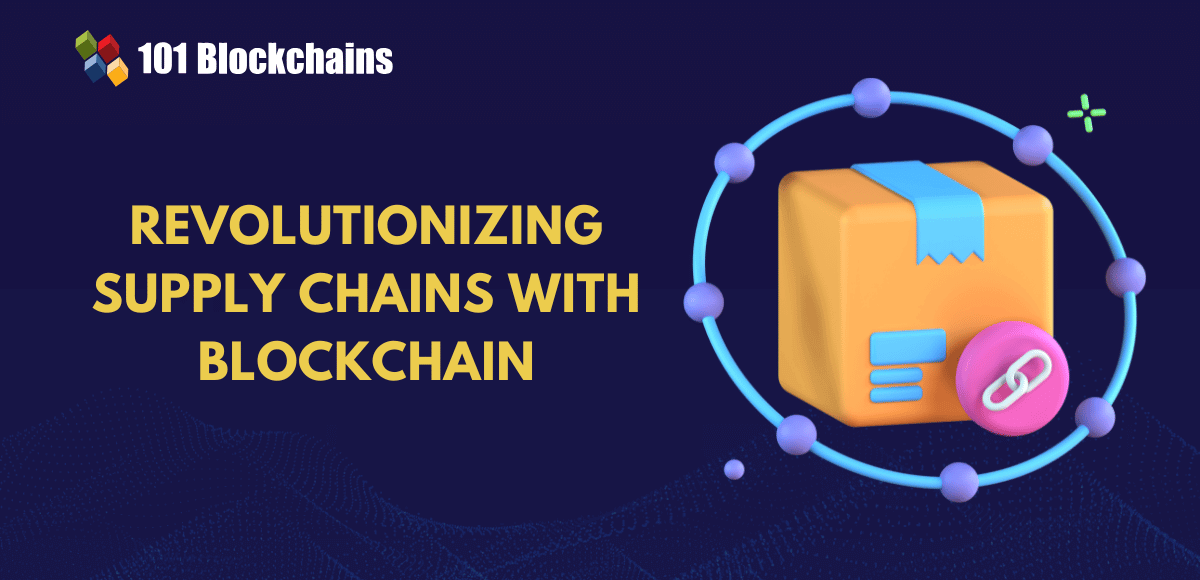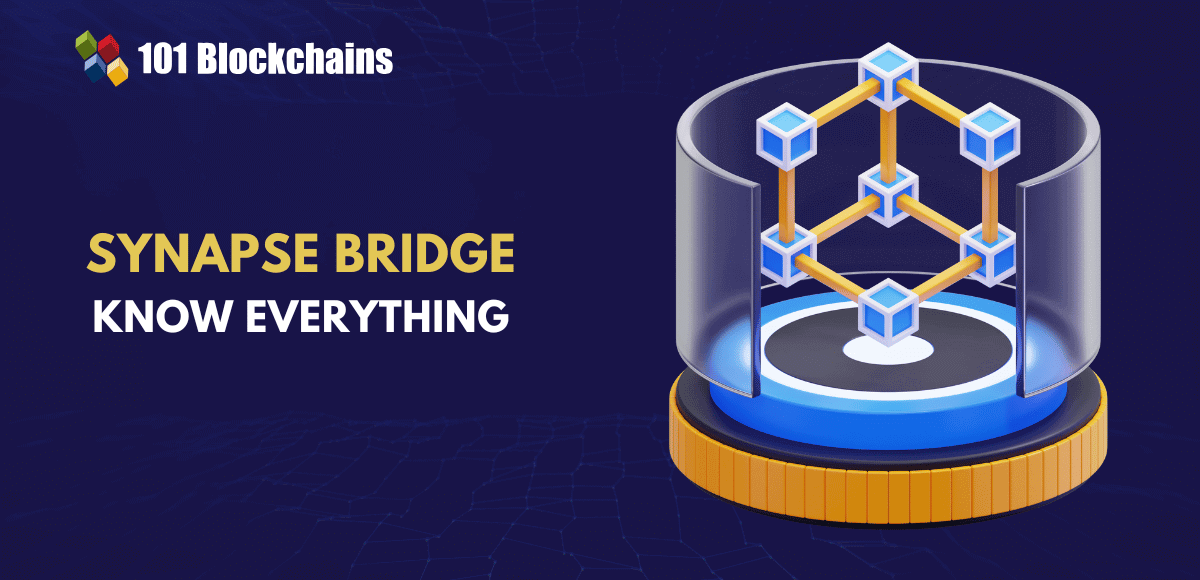Learn how blockchain truly works, master key definitions, and uncover what makes smart contracts so "smart." Dive into the fundamentals, gain valuable insights, and start your blockchain journey today!

- Blockchain
101 Blockchains
- on May 26, 2021
Blockchain Explained in Plain English!
This guide gets blockchain explained in simpler terms for those who are new to the concept of blockchain technology.
Blockchain technology is becoming more and more popular over the years. This disruptive technology has been changing almost every industry in a good way. Trends suggest that the uprising of blockchain technology will only move in an upward direction.
So, if you want to make the most of it, you need to educate yourself on the fundamentals of blockchain technology. While most other online sources use technical jargon, we plan on helping you with blockchain explained in simpler terms.
Build your identity as a certified blockchain expert with 101 Blockchains’ Blockchain Certifications designed to provide enhanced career prospects.
Blockchain Explained Simply!
First, think of an ordinary ledger, where you, the owner of the company records the profits of your company. However, there is a black sheep in your company who changes all the data in the ledger and steals money from your company!
You need to solve the issue!
So, you hired an IT professional to create a digital ledger on your computer. But the black sheep, again got into the ledger by hacking, and changed the figures!
Now, you’re angry! You need a full-proof system where you can store your data — a tamperproof, hack-proof way.
Blockchain can SOLVE your problem!
In layman’s terms, it is a system of storing data where it is impossible (practically) to alter, tamper, or hack the data, also everyone who has access to the system can ensure the integrity of the system!
So, to get blockchain explained in plain English, try to think of something like this —
- A digital ledger
- Distributed to all members of the network
- Decentralized as no authority has supreme power over the system
- Encrypted and secured via means of cryptography
- Immutable, meaning every change is permanent on the ledger
- Every node of the network follows a consensus
What is Blockchain Technology and How Does It Work?
In technical terms, blockchain technology refers to the system where a peer-to-peer distributed ledger stores data and allow peers to transact between them without any centralized authority.
All members in the network have an individual copy of the entire distributed ledger. Also, the network follows a consensus protocol that allows data transactions and the creation of new blocks with a timestamp.
In a blockchain, there is a linear chain of blocks, and each block is connected to the previous block. How? Each of the blocks contains four key components —
- Data — Any information that you want to store securely in the blocks
- Hash — Unique identifier assigned to one specific block
- Hash of the Previous Block — Includes the previous hash value construct the structure of the blocks
- Meta Data — Relevant data regarding the data inside the block; i.e., timestamp or block number.
These four components essentially create the skeleton of the entire blockchain.
Curious to learn about blockchain implementation and strategy for managing your blockchain projects? Enroll Now in Blockchain Technology – Implementation And Strategy Course!
Basic Features of Blockchain Explained
Now that you understand what blockchain technology is and how does it work, it’s time to take a deeper look at some of the core features of blockchain.
Here are the four core features of blockchain technology —
Distributed
Unlike the current centralized systems, blockchain technology distributes a copy of the ledger to all members and all nodes of the network. So, in case, the hard disk on your computer crashes with all the data wiped out, you don’t have anything to worry about. Every member of the network has a copy of it.
Also, to take down the network, a hacker will have to wipe out every node of the network. In other words, the computing power of the hacker’s computer has to be greater than the computing power of all computers connected to the network.
Trustless
Do you trust a stranger online with whom you have never talked? Of course not! So how can you trust other members on the network verifying transactions?
You don’t!
So, rather than putting your trust in other humans, you simply put trust in the entire system that follows a specific consensus algorithm. The consensus algorithm verifies every transaction.
If any transaction violates this consensus algorithm, the transaction itself gets violated. So, even if the parties don’t trust each other, it doesn’t matter. The system is designed to ensure safety and common trust among the users.
Immutable
Every transaction and creation of new data is permanent on the blockchain. You cannot change or alter any block. This feature makes it immutable.
Now, immutability is like a double-edged sword. As immutability ensures robustness and sustainability, it makes blockchains a good thing. However, this feature negates the fact that humans make mistakes. Even if you send money to someone by mistake, you cannot take it back.
Start learning Blockchain with World’s first Blockchain Skill Paths with quality resources tailored by industry experts Now!
Decentralized
You might be wondering what if the person or organization that controls the blockchain network decides to leak your private information?
It’s not possible! Why? Because there is NOT any person or organization that controls the network. The system is autonomous and decentralized. So, there is no third-party prying over your private information.
Not sure how to build your career in enterprise blockchains? Enroll Now in How to Build Your Career in Enterprise Blockchains Course
Blockchain Technology Use Cases
Despite the initial application as a cryptocurrency, blockchain has moved further away and offered solutions in every industrial sector. So, stop connecting it only with cryptocurrencies.
If you take a look at the top companies using blockchain technology, you’ll notice that none of them are capitalizing on cryptocurrencies. Rather they use them as modern tools for betterment.
Here are the notable ones —
- Real estate
- Trade Finance
- Governance
- Healthcare
- Logistics and transportation
- Supply Chain Management
- Insurance
Start learning Blockchain with World’s first Blockchain Career Paths with quality resources tailored by industry experts Now!
Final Thoughts
Nowadays, the blockchain isn’t just a public ledger. It can do various things like smart assets – maintaining the ownership of real-world holdings on the blockchain, smart contracts – which are self-executing programs that have the potential to eliminate lawyers and courtrooms, and many different things.
To know more about the fundamentals of blockchain technology, enroll now in this free blockchain fundamental course.
*Disclaimer: The article should not be taken as, and is not intended to provide any investment advice. Claims made in this article do not constitute investment advice and should not be taken as such. 101 Blockchains shall not be responsible for any loss sustained by any person who relies on this article. Do your own research!






